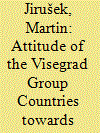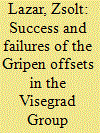|
|
|
Sort Order |
|
|
|
Items / Page
|
|
|
|
|
|
|
| Srl | Item |
| 1 |
ID:
176718


|
|
|
|
|
| Summary/Abstract |
The article analyses individual stances of the Visegrad Group countries (i.e. Czech Republic, Slovakia, Poland and Hungary) towards infrastructural projects in the natural gas sector currently being built by Gazprom, and determining factors influencing their respective attitudes. More specifically, the research focused on Nord Stream 2 and TurkStream, pipelines that aim at supplying Europe while circumventing traditional transit countries in the central and Eastern Europe, including the Visegrad group countries. The paper is organized as a series of individual case studies, each dedicated to one state under scrutiny. The author concluded that there is no common ground upon which a unified stance of the Visegrad Group could be formulated in this regard. Also, the states differ in adherence to theoretical attitudes to energy policy in general. Despite the declared unity, the Visegrad Group states pursue their own goals determined by economic interests or long-standing foreign policy stance. Consequently, central Europe is fragmented in its attitude towards the Russian infrastructural projects and thus more prone to penetration and individualized deals.
|
|
|
|
|
|
|
|
|
|
|
|
|
|
|
|
| 2 |
ID:
176782


|
|
|
|
|
| Summary/Abstract |
The energy policy of The Visegrad Group states (V4: Poland, Czechia, Slovakia and Hungary) is being challenged by, among many other factors, dependence on the import of energy resources, increasing environmental pressure, insufficient and disappointing process of energy policy Europeanisation. Therefore, all V4 states are seeking new energy policy solutions and directions, which is seen as a condition for both economic and political development. This paper provides a conceptualisation of the geopolitical dimensions of energy policy strategy, empirically focusing on its Southern direction. Firstly, it aims to identify and analyse the key areas of strategic thinking about energy security in the Visegrad states. Secondly, it attempts to answer the question of place and importance of the Southern Dimension (SD) in V4 energy policy strategies. In other words, it investigates whether the V4 states energy security can be improved by deepening energy cooperation with partners from southern regions, in particular with the MENA region. The hypothesis to be verified by this study states that the more hawkish V4 states’ energy security strategies are, the greater their preference for the liberalisation of the international energy market. The article follows the qualitative approach and relies on the case study methodology.
|
|
|
|
|
|
|
|
|
|
|
|
|
|
|
|
| 3 |
ID:
175270


|
|
|
|
|
| Summary/Abstract |
The policy of diversification of natural gas supplies requires the extension of appropriate energy infrastructure. The V4 countries consume over 42 bcm natural gas a year. The dominant position in the region is held by the Russian Federation, which supplies the gas to different countries at different prices. Hence, the aim of the paper is to determine what role the Baltic Sea region is going to play for V4 countries as an opportunity to break this dominance. An added value of this article is the identification of the policy factors influencing the strategic importance of the Baltic Sea Region in the context of diversification of energy supply sources. The research hypothesis has been put forward that the development of gas infrastructure in the Baltic Sea Region will have an impact on strengthening the geoeconomic space of the Visegrad Group countries. The author will attempt to answer the following research questions: How should the potential of the Baltic Sea be used to strengthen the energy security of V4 countries? In what way should the gas infrastructure between the Visegrad Group states be developed?
|
|
|
|
|
|
|
|
|
|
|
|
|
|
|
|
| 4 |
ID:
167177


|
|
|
|
|
| Summary/Abstract |
The Soviet-led Council for Mutual Economic Assistance member, Central European countries found themselves in a difficult political and economic situation after the collapse of the Soviet Union. Three post-Eastern Bloc countries formed the Visegrad Group to strengthen their ties to the West, but the need for foreign investment, job creation and technology transfer was urgent.
|
|
|
|
|
|
|
|
|
|
|
|
|
|
|
|
| 5 |
ID:
176717


|
|
|
|
|
| Summary/Abstract |
Our research focuses on EU energy and climate policy by examining the voting behaviour of Visegrad members of European Parliament (MEPs) during the Eighth Parliament (covering the period 1 July 2014–18 April 2019). In contrast to the main streams of literature, which primarily analyse the Visegrad countries (Czechia, Hungary, Poland and Slovakia) as an example of a regional coalition and their role in the EU, we focus on the internal coherence of the group and especially issues on which they vote differently as well as their voting affiliation with political groups within the European Parliament. Our research is methodologically based on the analysis of roll-call votes (RCV). We conclude that there is considerable heterogeneity evident in MEP voting behaviour and thus we can assume that the relative proximity among Visegrad countries’ positions is not apparent in the European Parliament. Moreover, we have confirmed that hard Eurosceptic MEPs are not a homogenous group and in the EP seeking support for legislative approval is more difficult than may be expected.
|
|
|
|
|
|
|
|
|
|
|
|
|
|
|
|
|
|
|
|
|